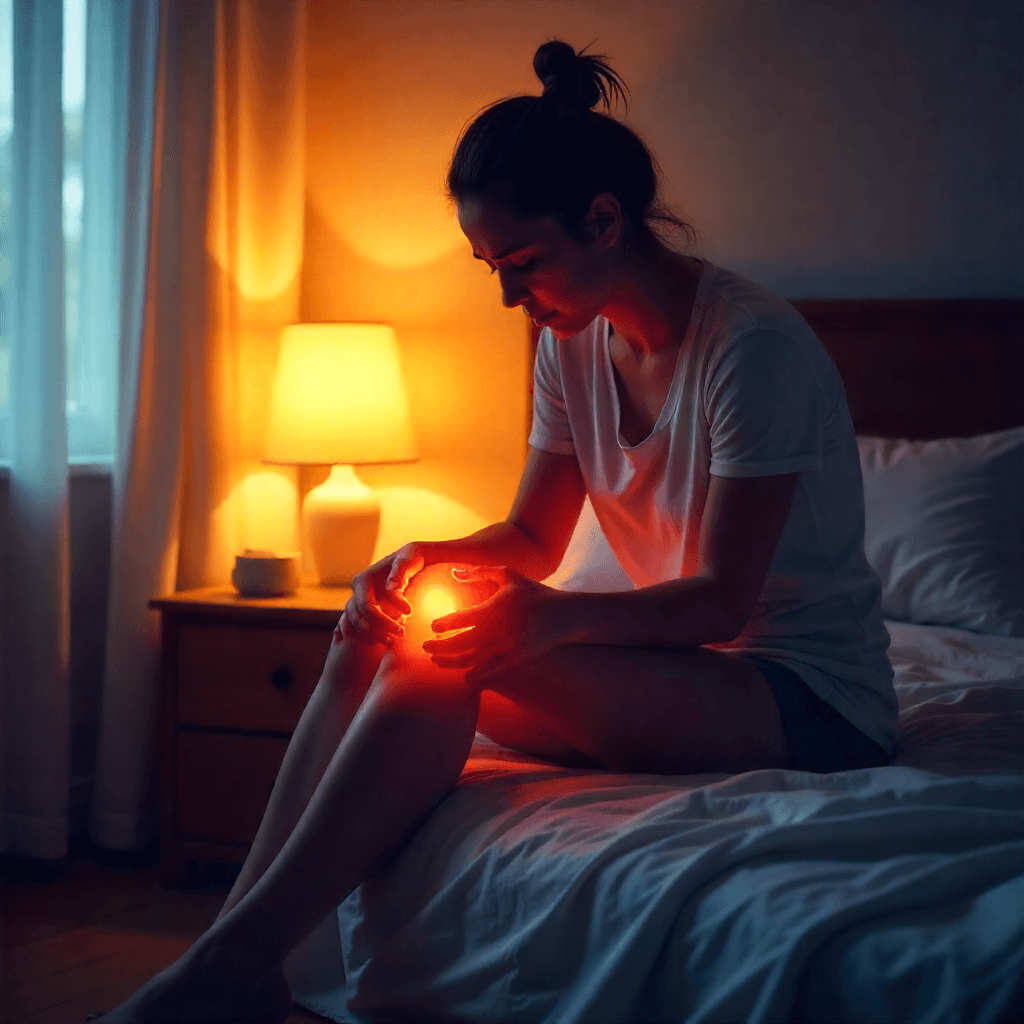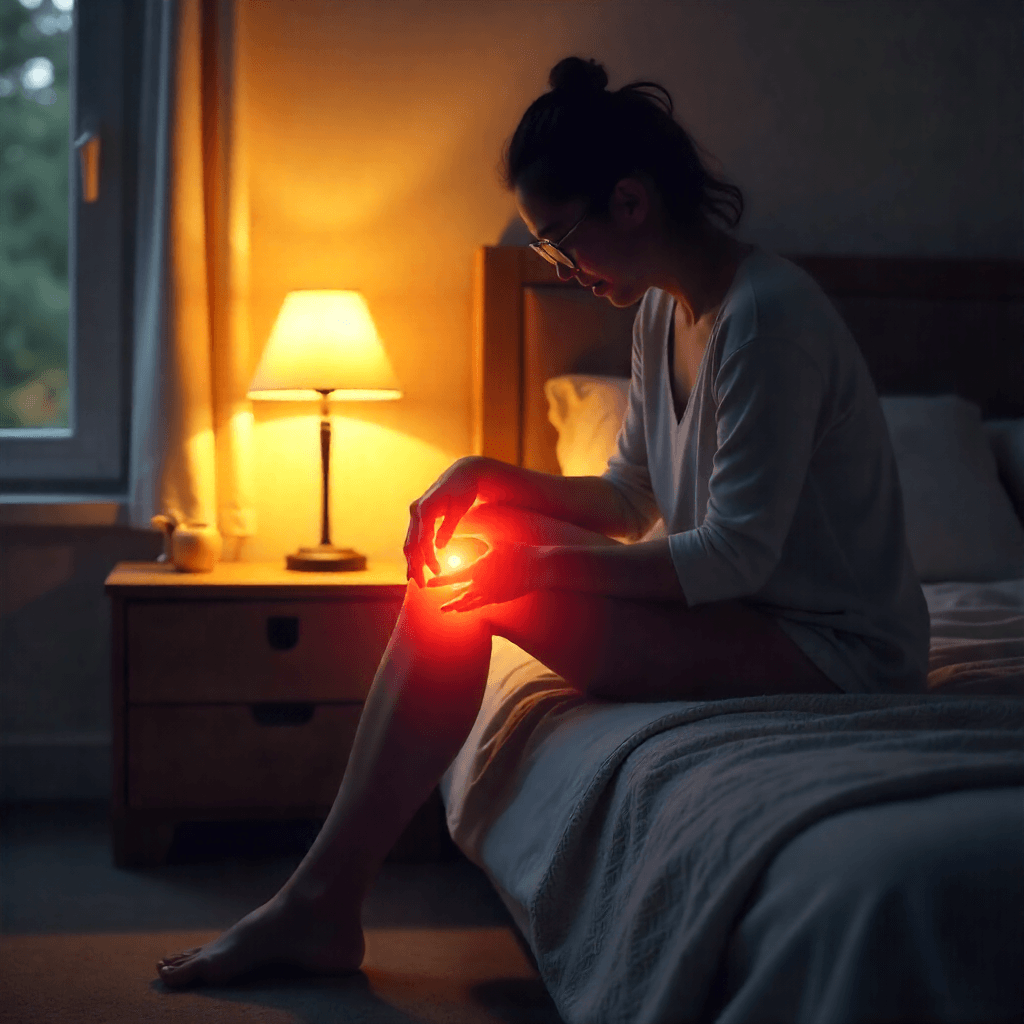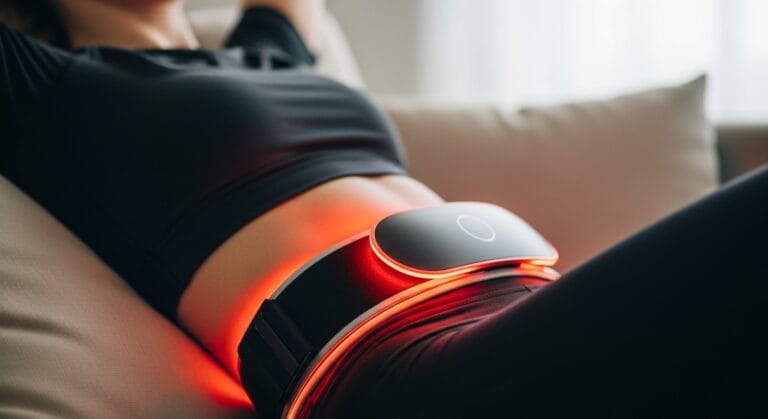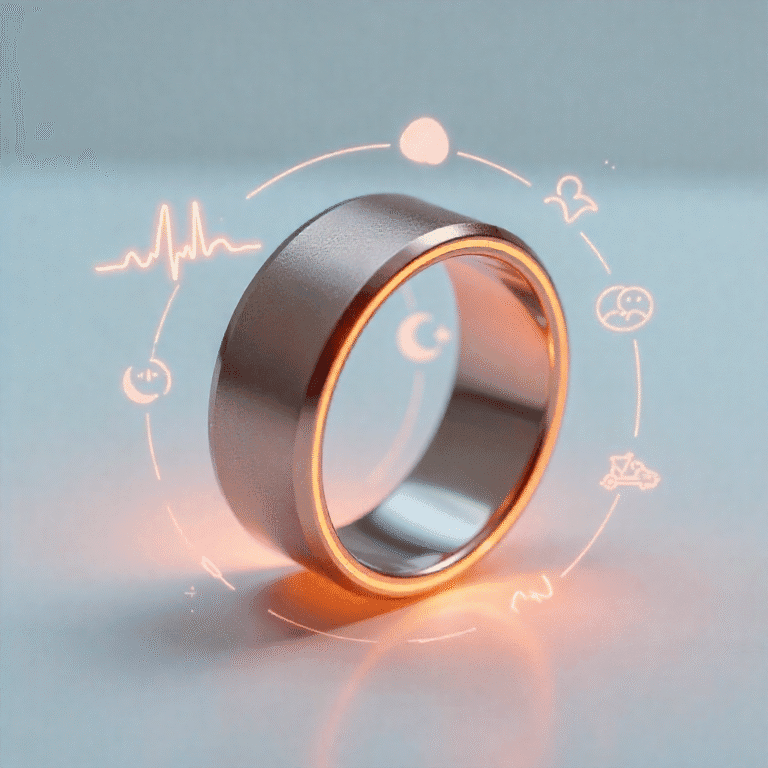Aching Knee at Night Time: Causes, Relief, and Better Sleep
Aching knee at night time can disrupt sleep and affect your quality of life. Understanding why this happens is the first step toward finding lasting relief.
Why Your Knees Ache More at Night
1. Osteoarthritis
- Cartilage breakdown leads to pain and stiffness.
- Pain often worsens after a day of movement or standing.
2. Bursitis
- Inflammation of bursae (small fluid-filled sacs) causes throbbing or stabbing pain.
- Pain can increase when you lie on the affected side.
3. Tendinitis or Overuse
- Overuse or repetitive stress inflames knee tendons.
- Pain flares up when the body is at rest after engaging in heavy activity.
4. Injury or Meniscus Tear
- Past injuries can trigger nighttime discomfort.
- Deep, localized pain may signal cartilage damage.
5. Inflammatory Conditions
- Rheumatoid arthritis, gout, or a knee infection can make pain worse at night.

Home Remedies for Aching Knee at Night Time
- Ice or Heat Therapy: Use ice for swelling and heat for stiffness.
- Gentle Stretching: Stretch hamstrings, calves, and quads before bed.
- Supportive Pillow: Place under or between knees for better alignment.
- OTC Pain Relief: NSAIDs like ibuprofen (consult a doctor before use).
- Elevation: Keep your knee slightly raised on a pillow to ease pressure.
Best Sleeping Positions for Knee Pain
- Back Sleeping: Place a pillow under both knees to relieve joint pressure.
- Side Sleeping: Put a pillow between your knees for better hip and spine alignment.
- Avoid Curling Up Too Much: It increases joint compression and pain.
When to See a Doctor
Seek medical advice if you experience:
- Severe pain that doesn’t improve with rest
- Redness, swelling, or warmth around the knee
- Pain after a recent injury
- Pain that interrupts daily activities
Prevention Tips
- Maintain a healthy weight to reduce pressure on knees
- Wear supportive shoes
- Strengthen your quads and hamstrings to stabilize the knee joint
- Choose low-impact exercises like cycling, swimming, or walking
Quick Comparison Table: Aching Knee at Night Time
| Cause | Common Symptoms | Best Relief Method |
|---|---|---|
| Osteoarthritis | Aching, stiffness, grinding sound | Heat therapy, stretching, joint supplements |
| Bursitis | Sharp pain, swelling, tenderness | Ice packs, anti-inflammatory meds, rest |
| Tendinitis/Overuse | Pain after activity, tenderness | Gentle stretching, activity modification |
| Meniscus Injury | Deep joint pain, clicking, locking | Physical therapy, doctor evaluation |
| Inflammation (RA, Gout) | Swelling, redness, warmth | Medical treatment, prescribed anti-inflammatories |
Conclusion About Aching Knee at Night Time
Nighttime knee pain is often linked to arthritis, overuse, or past injuries, but simple changes can bring relief. Using the right sleep positions, using heat or ice, and doing gentle exercises can help keep your joints strong. If pain persists or worsens, consult a doctor to identify the root cause and get the right treatment.
FAQs About Aching Knee at Night Time
How to relieve knee pain at night
The best way to relieve knee pain at night is to support your joints and reduce inflammation. You can place a pillow between or under your knees to keep them aligned. Use a heating pad or ice pack based on whether the pain feels stiff or swollen. You can also take an over-the-counter anti-inflammatory medication if needed. Gentle stretching before bed and maintaining a comfortable sleep position can also help prevent nighttime knee discomfort.
Throbbing knee pain at night
Throbbing knee pain at night is often linked to inflammation, arthritis, or an injury that worsens when the body is at rest. Blood flow naturally increases while lying down, which can intensify the sensation of pain. If the pain is persistent or wakes you frequently, it’s best to see a doctor to rule out conditions like osteoarthritis, bursitis, or tendon issues.
Knee pain when lying down but not standing
If your knees hurt when lying down but not when standing, the issue may be related to your sleep position, pressure on the joints, or inflammation that feels worse when the body is still. Sometimes, fluid buildup in the knee (effusion) causes discomfort at rest, but activity keeps it moving. Adjusting your sleeping position with a supportive pillow can make a big difference.
Why do my knees hurt when I sleep on my side
When you sleep on your side, one knee can press against the other, causing joint pressure and pain. Conditions like arthritis or cartilage wear can make this more noticeable. Placing a pillow between your knees can reduce the pressure and help align your hips and spine, often easing the pain.
Osteoarthritis knee pain at night
Osteoarthritis is a common cause of knee pain at night because the cartilage cushioning the joint wears down, leading to stiffness, swelling, and throbbing discomfort. Night pain often happens because joints remain in one position for hours, making stiffness worse. Using heat before bed, gentle stretching, and supportive pillows can help reduce osteoarthritis pain at night.
Throbbing knee pain at rest
Throbbing knee pain at rest may point to inflammation, arthritis, or a vascular issue. Unlike pain with activity, resting pain suggests an underlying condition that isn’t solely caused by movement. If your knee pain continues at rest, it’s important to get it checked, especially if it comes with swelling, redness, or warmth.
Knee pain at night young age
Knee pain at night in younger people often comes from overuse injuries or sports activities. It can also happen because of conditions like patellofemoral pain syndrome, which is called runner’s knee. Another condition is Osgood-Schlatter disease, which affects teenagers. Growth spurts can also cause nighttime knee pain in kids and adolescents. Rest, stretching, and proper footwear can help, but persistent pain should be evaluated.
Knee pain in ladies
Knee pain in women can be caused by many factors. These include hormonal changes and differences in hip and leg alignment. Conditions like patellofemoral pain syndrome, early osteoarthritis, and rheumatoid arthritis can also play a role. Women may also experience knee pain during menopause due to changes in joint health. Staying active, keeping a healthy weight, and strengthening your leg muscles can help manage and prevent knee pain.
Why do knees hurt worse at night?
Inflammation tends to worsen during inactivity, making knee pain more noticeable when lying down.
What is the best sleeping position for knee pain?
Sleeping on your back with a pillow under your knees is the most joint-friendly position.
Can exercise reduce nighttime knee pain?
Yes, strengthening and stretching exercises help improve joint support and reduce pain.
When should I worry about knee pain at night?
Seek medical attention if pain is constant, severe, or paired with swelling, redness, or fever.







